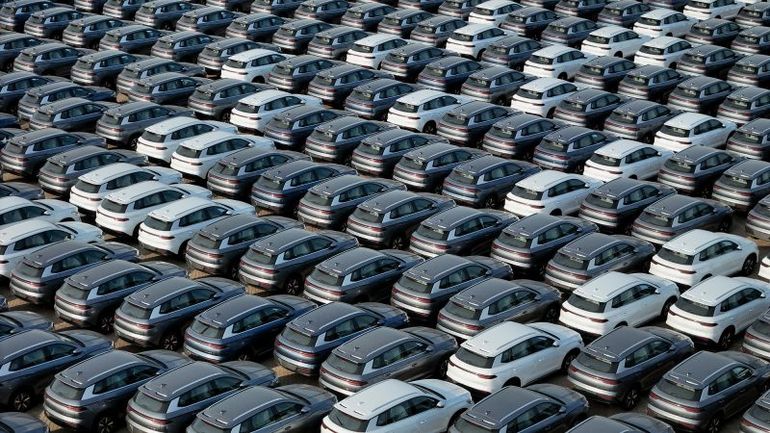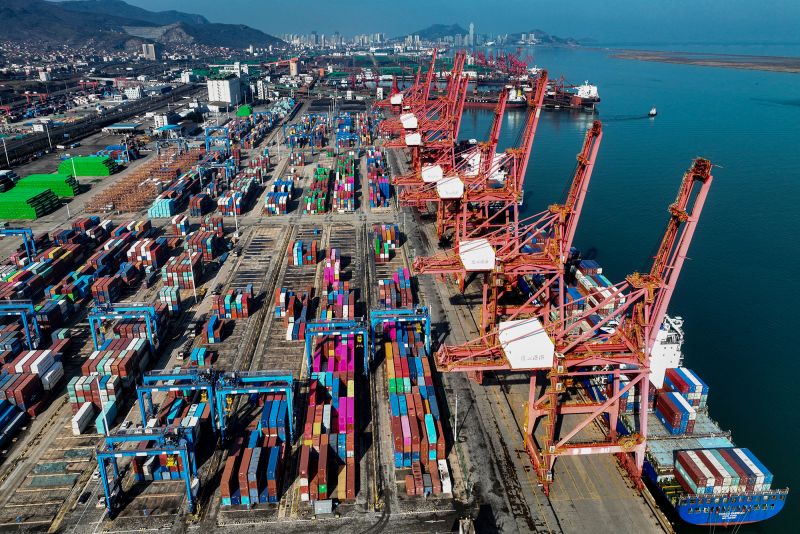
Implications of Biden's Increased EV Tariffs on Global Trade Dynamics

President Biden's decision to raise tariffs on Chinese electric vehicles to 100% has significant implications for the global automotive industry. This move effectively restricts access to a major market for the leading EV producer, potentially sparking trade tensions between Europe and China.
US President Joe Biden has increased tariffs on electric vehicles from China to 100%, restricting access to the US market for the largest global producer of EVs.
On Tuesday, Biden expressed his commitment to having electric vehicles manufactured in America by union workers. However, the competition for EV dominance may actually be happening in Europe.
The United States doesn't buy many EVs from China at the moment. However, in Europe, Chinese EV manufacturers have found a significant market. This puts pressure on the European Union to protect its automakers from increased competition from Chinese imports if they face higher tariffs in the US.
According to Joseph Webster, a senior fellow at the Atlantic Council, the recent US tariffs on EVs and other goods from China could push the EU to take action. Higher tariffs in the US might result in more trade being redirected to Europe, including semiconductors and batteries.
He added on the think tank's website that Brussels will need to make a fast decision. They may have to impose tariffs on their own or deal with an influx of Chinese products.
The EU is currently looking into whether Chinese EV makers are receiving state support. If it's discovered that their prices are unnaturally low, additional import duties will be announced by early July. Brussels is concerned that subsidies from Beijing could be giving Chinese carmakers an unfair advantage over European competitors.
Agatha Kratz, a director at research provider Rhodium Group, mentioned that the increase in US tariffs on Chinese EVs paves the way for the EU to potentially raise their tariffs to 30%, which is three times higher than the current level.
According to Kratz, matching US tariffs would be quite challenging for Brussels. She explained to CNN that the EU would find it difficult to justify going beyond 30% because the tariffs should be in line with the results of the investigation on the extent of subsidization in China.
She added that the EU will need to explore other tools and defensive instruments to try and stem the flow of China-made EVs coming into Europe. These measures could include targeting data security, as well as strict enforcement of environmental and labor standards. Additionally, there is a concern that EU tariffs could backfire.
Citi reports that last year, the EU received 36% of Chinese EV exports, which is more than the total of the next five largest markets combined. In comparison, the United States only gets 1.1% of China's EV exports, amounting to less than $365 million, as stated by consultancy Capital Economics.
One reason for Chinese brands' success is their lower production costs compared to European competitors. Researchers at Rhodium Group suggest that duties of 40% to 50% may be needed to deter Chinese EV exporters from the European market.
For China's largest electric vehicle manufacturer, BYD, experts suggest that tariffs would need to be increased even further to make a significant impact. Unfortunately, the chances of duties reaching such high levels are slim, as noted by the Rhodium Group.
SAIC-GM-Wuling Automobile Co. electric vehicles are plugged in at charging stations at a roadside parking lot in Liuzhou, China, on Monday, May 17, 2021.
SAIC-GM-Wuling Automobile Co. electric vehicles are plugged in at charging stations at a roadside parking lot in Liuzhou, China, on Monday, May 17, 2021.
Qilai Shen/Bloomberg/Getty Images
Related article
A brutal elimination round is reshaping the world’s biggest market for electric cars
European automakers could be negatively impacted by these tariffs as they produce cars in China for sale in Europe. BMW CEO Oliver Zipse cautioned Europe to be careful during an earnings call with reporters last week.
"We believe our industry doesn't need protection," he mentioned to analysts. He emphasized that having a global presence is beneficial, and implementing import tariffs could jeopardize this advantage.
The EU is also cautious about not provoking retaliation from Beijing, as this could pose challenges for European car manufacturers selling their vehicles in China.
According to Tu Le, managing director at Sino Auto Insights, a consulting firm, the EU's situation is quite distinct from that of the US. This is because German automakers heavily depend on the Chinese market for a large portion of their sales and profits. As a result, the likelihood of the EU taking drastic measures is very low.
Is a trade war on the horizon?
Western officials are increasingly concerned about protecting domestic jobs and strategically important industries from being overtaken by cheap Chinese imports. Biden's tariffs reflect this growing sense of urgency.
Despite China being a more critical trade partner for the EU than the United States, as it represents a larger market for EU goods exports, Brussels is now adopting a more protective approach towards trade.
In addition to the probe into Chinese EVs, the EU is investigating alleged dumping of industrial products by China or unfair state support for Chinese makers of wind turbines.
This photo shows an aerial view of shipping containers stacked at the Lianyungang Port in Lianyungang, in eastern China's Jiangsu province on March 26, 2024.
This photo shows an aerial view of shipping containers stacked at the Lianyungang Port in Lianyungang, in eastern China's Jiangsu province on March 26, 2024.
STR/AFP/Getty Images
Related article
A glut of cheap Chinese goods is flooding the world and stoking trade tensions
Kratz from Rhodium Group mentioned that the EU is currently utilizing all available tools to protect its economy and European jobs against what it views as unfair trade practices from China. She also pointed out that there seems to be a low-level trade war ongoing between the EU and China.
She further stated that we are now entering a tense period in terms of trade interactions and trade defense.
The White House announced tariffs on Tuesday, stating its intention to collaborate with allies in addressing concerns about China's unfair trade practices. Additionally, the United States may urge the EU and other allies to decrease their dependence on trade with China, similar to its successful efforts in the semiconductor industry.
Leaders from the Group of Seven developed economies will gather at a summit in Italy next month to talk about ways to safeguard their industries against competition from China.
Josh Lipsky, a senior director at the Atlantic Council, mentioned that the upcoming weeks will be crucial. He pointed out that if Europe and the G7 nations align their policies with the United States, it could signal to Beijing that the situation has changed.
Europe could choose to hedge its bets by completing its anti-dumping review. This decision could support China's perspective that their main challenge lies with the United States, rather than other advanced economies.
Reporting from Hong Kong was contributed by Juliana Liu.
Editor's P/S:
The article highlights the escalating trade tensions between the US, EU, and China over electric vehicles (EVs). US President Biden's 100% tariffs on Chinese EVs have prompted concerns that the EU will be flooded with Chinese imports, potentially harming European automakers. While the US has a limited market share for Chinese EVs, the EU has become a significant destination. The article suggests that the EU may consider imposing tariffs on Chinese EVs, but faces challenges in balancing protectionism with potential retaliation from Beijing. The situation is further complicated by the heavy reliance of German automakers on the Chinese market. Overall, the article sheds light on the complex geopolitical dynamics shaping the global EV market, as countries grapple with the need to protect domestic industries while navigating diplomatic relations.
Additionally, the article raises concerns about the potential for a broader trade war between the West and China. The EU's investigation into alleged dumping of industrial products and unfair support for Chinese wind turbine makers indicates a growing protectionist sentiment. The upcoming G7 summit will provide a crucial opportunity for Western leaders to coordinate their policies towards China and address concerns about unfair trade practices. The outcome of these discussions will have significant implications for the global trade landscape and the future of the EV industry.











